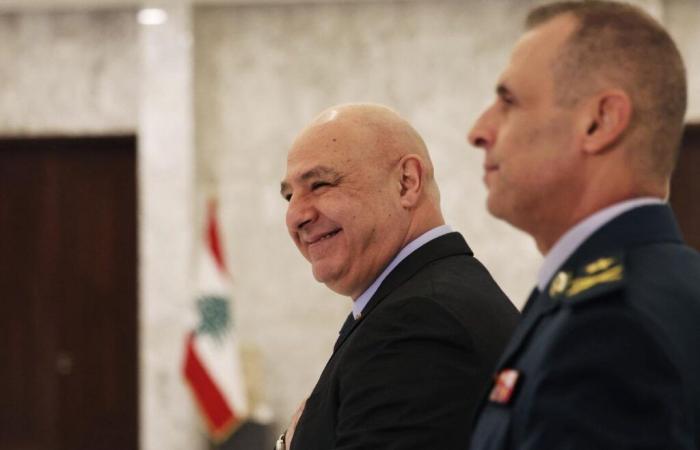Lebanon –
Consultations will begin for the post of Prime Minister
Najib Mikati and Fouad Makhzoumi are the two favorites for the post of prime minister, which will be chosen by the new Lebanese President Joseph Aoun.
Published today at 1:04 a.m.
Lebanon’s newly elected President Joseph Aoun at the Baabda presidential palace near Beirut on January 10, 2025.
AFP
Subscribe now and enjoy the audio playback feature.
BotTalk
The new Lebanese President, Joseph Aoun, begins parliamentary consultations on Monday with a view to appointing a prime minister to form a government which will face major challenges in a country in crisis.
These consultations, a constitutional obligation within the framework of the confessional power-sharing system in Lebanon, come a few days after the election of Joseph Aoun, under foreign pressure, notably from the United States and Saudi Arabia, to a quick exit.
Led by an interim government led by Najib Mikati, the small Mediterranean country has had no president since October 2022 due to political dissension, despite a serious economic crisis and the conflict which lasted for more than a year, before a ceasefire. -fire at the end of November, Lebanese Hezbollah to Israel.
Two years of vacation
Among the names mentioned for the post of prime minister, which is reserved for a Sunni Muslim, is Najib Mikati, the anti-Hezbollah MP Fouad Makhzoumi and the judge president of the International Court of Justice (ICJ) which sits in The Hague (Country -Low), Nawaf Salam.
Joseph Aoun will begin consultations at 8:00 a.m. local time (7:00 a.m. Swiss) by meeting the powerful Speaker of Parliament and ally of pro-Iranian Hezbollah, Nabih Berri. This formation and Nabih Berri’s Amal movement support Najib Mikati, a source close to Hezbollah told AFP.
His designation “is part of the agreement concluded with the Saudi envoy (…) which led Hezbollah and Amal to vote to elect Joseph Aoun as president” on January 9, added this source on condition of anonymity due to the sensitive nature of the file.
Saudi Arabia and the United States have been at the forefront of international diplomatic efforts to end Lebanon’s two-year presidential vacancy. Riyadh had previously distanced itself from the Lebanese political scene for years, opposed to the influence of Hezbollah, since greatly weakened by its confrontation with Israel.
Major challenges
Najib Mikati, who maintains good relations with Lebanese political parties and several foreign countries, denied the existence of such a prior agreement. Whoever the next prime minister is named, he or she will face major challenges, including implementing economic reforms to satisfy international donors.
He will also have the heavy task of rebuilding entire sections of the country after the war between Israel and Hezbollah and implementing the ceasefire agreement of November 27, which notably provides for a withdrawal of Hezbollah from the border area with Israel.
Opposition deputies who are members of a group including the Christian party of the Lebanese Forces (FL) announced on Saturday that they were supporting Fouad Makhzoumi, a wealthy businessman who has good relations with the Gulf countries and Washington.
“Previous batch”
Visiting Lebanon last week, American envoy Amos Hochstein went to the home of Fouad Makhzoumi to meet opposition deputies. Other MPs proposed the name of Nawaf Salam, a highly respected former ambassador, whose name frequently comes up during these consultations.
Sunday ended with last-minute attempts to unify the positions of the opposition and independents behind Nawaf Salam, and to block Najib Mikati. The political forces opposed to Hezbollah consider that Najib Mikati is part of an outdated political system under the influence of this formation.
After Joseph Aoun promised a “new phase” for Lebanon, the leader of the FL, Samir Geagea, judged that Najib Mikati was part of “the previous lot”. According to the Lebanese constitution, the president designates, in consultation with the speaker of Parliament, the candidate who received the most votes during the consultations. There is then no guarantee of the immediate formation of a government, the process having in the past taken up to months, delayed by political divisions.
“Latest news”
Want to stay on top of the news? “Tribune de Genève” offers you two meetings per day, directly in your email box. So you don’t miss anything that’s happening in your canton, in Switzerland or around the world.
Other newsletters
Log in
AFP
Did you find an error? Please report it to us.
0 comments






